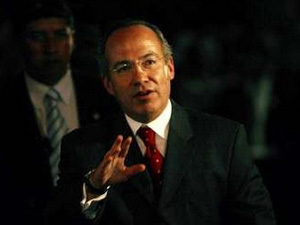
|  |  |  News Around the Republic of Mexico | January 2009 News Around the Republic of Mexico | January 2009  
Drug Violence Surges in Mexico
 Jonathan Adams - Christian Science Monitor Jonathan Adams - Christian Science Monitor
go to original


| | President Felipe Calderón's decision to confront organized crime has spurred drug cartels to fight back. |  |
Relatives of missing persons in Mexico pressed officials for help in finding their loved ones' remains after a man last week admitted to helping a drug gang dispose of more than 300 bodies using corrosive chemicals.

The macabre admission is just the latest indication of the depth of Mexico's drug violence. Some US observers say the cartels now pose a direct threat to the Mexican government's survival, and, by extension, a growing security threat to the US. But Mexican officials and analysts say such views are overly alarmist.

Reuters reported that more than 5,700 people were killed in drug violence last year in Mexico, "nearly double the number of 2007."

The wire service reported that dozens of families had approached officials for help in finding their relatives after the arrest of Santiago Meza Lopez last week.

News of Meza's arrest prompted dozens of families to come forward seeking news of missing loved ones. The state prosecutors' office said it was looking into more than 450 missing persons' cases from the past eight years.

"We have hope that some of the victims are our relatives. I'll be at peace when I know where my son's body is," Fernando Oseguera, whose son disappeared in 2007, told a news conference.

The Mexican newspaper Prensa reported details of the case. Mr. Lopez, alias "El Pozolero [the stew maker]," said he was paid $600 per month to help the Arellano Pelix drug cartel dispose of bodies (link to article in Spanish).

The New York Times explained that "pozole" is a "popular Mexican stew that can feature pork, hominy and an array of vegetables and seasonings." The newspaper reported that police paraded Meza before reporters on Friday on the outskirts of Tijuana, and that Meza publicly asked for forgiveness from the families of the victims.

The Wall Street Journal wrote in an opinion piece that the "body count" in drug-related violence in Mexico so far this year is already 354. It noted that a police commander was recently beheaded in the Mexican state of Chihuahua, an "increasingly popular tactic."

The paper traced the recent surge in drug-related violence to the Mexican president's bid to confront gangsters.

President Felipe Calderón began an assault on organized crime shortly after he took office in December 2006. It soon became apparent that the cartels would stop at nothing to preserve their operations, and that a state commitment to confrontation meant that violence would escalate.

As bad as the violence is, it could get worse, and it is becoming clear that the U.S. faces contagion. In recent months, several important American voices have raised concerns about the risks north of the border.

The paper reported that the US Joint Forces Command in Norfolk, Virginia, "warned recently that an unstable Mexico 'could represent a homeland security problem of immense proportions to the United States.'"

The Los Angeles Times added that the report said Mexico should be "monitored alongside Pakistan as a 'weak and failing' state that could crumble swiftly under relentless assault by violent drug cartels."

The newspaper said that the US Joint Forces Command report was only one of several alarms being sounded on the security situation south of the border.

Retired U.S. Army Gen. Barry R. McCaffrey, the former U.S. drug agency director, said in a separate analysis on Mexico that the government "is not confronting dangerous criminality -- it is fighting for its survival against narco-terrorism" and could lose effective control of large swaths near the U.S. border.

The outgoing CIA director, Michael V. Hayden, listed Mexico with Iran as a possible top challenge for President Obama.

And former U.S. House Speaker Newt Gingrich said this month that Mexico could turn into a surprise crisis for the new president by year's end.

But the newspaper noted that Mexican officials and some analysts dispute such alarmism. "'It's a very bad analysis,' said Raul Benitez, an expert on security and US-Mexico relations at the National Autonomous University of Mexico. 'Mexico has some failed institutions inside the government, but not the whole state.'"

In a letter to the El Paso Times published Sunday, Mexico's ambassador to the United States, Arturo Sarukhan, rejected the notion that Mexico might be on the verge of collapse, saying that was "plainly preposterous."

The violence unleashed by trafficking organizations in response to President Calderón's effort to shut them down cannot be denied.

[But if] one considers the criteria that could lead to a "sudden collapse" – loss of territorial control; inability to provide public services; refugees and internally displaced people; criminalization of the state; sharp economic decline; and incapacity to interact as a full number of the international community -- it is obvious that Mexico simply doesn't fit the pattern. |

 |
|  |



